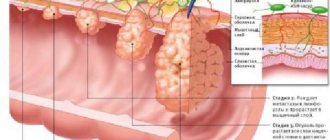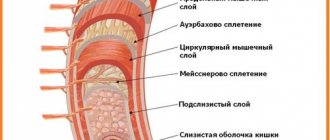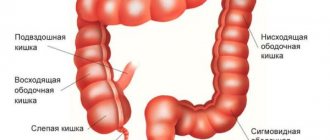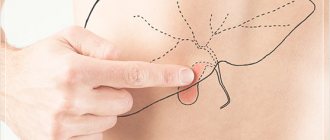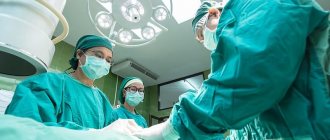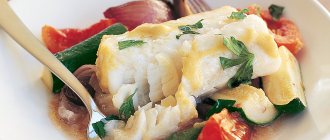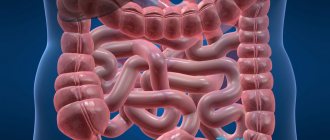Doctors recommend a balanced diet for rectal cancer to normalize the functioning of the gastrointestinal tract, as well as restore immune defense after treatment. With loss of appetite, characteristic of the last stage of the disease, it is important to have a complete intake of vitamins, macro- and microelements into the body. Diet is important after surgery to reduce the chance of recurrence.
Diet for sigmoid colon cancer after surgery
Sigmoid colon cancer is one of the most serious diseases of the gastrointestinal tract, which is a malignant neoplasm of epithelial origin.
The disease occurs in the sigmoid intestine and can develop in the initial stages of cancer development without clinical manifestations. Proper nutrition after surgery or after chemotherapy treatment for cancer of the sigmoid colon increases the body's ability to fight this severe pathology.
Goals of nutritional therapy
The main task of the diet is to normalize the functioning of the digestive system and intestinal motility. And although following it will not help cure cancer, nutritional therapy is an effective method of rehabilitation after tumor resection.
Regular consumption of foods that contain large quantities of fiber leads to the appearance of loose stools, while cleansing the digestive system of waste and toxins.
In any case, an experienced specialist should prescribe a diet; only he will be able to choose the most suitable diet that will suit a particular case.
General recommendations
To achieve the maximum therapeutic effect, when preparing a diet, the doctor must be guided by certain rules:
- Include fruits and vegetables in the menu, as their regular consumption has a positive effect on intestinal motility, which improves the passage of feces. Eating fiber is an effective preventative against inflammation of the gastrointestinal mucosa.
- After confirmation of cancer, consume vegetable oil , various cereals and low-fat fish every day. All these products have a positive effect on the digestive system.
- Regardless of the location of the cancerous lesion, the patient needs to eat fractionally , eat in small portions, but often (at least 5 times a day). The fact is that frequent consumption of warm food improves the functioning of the gastrointestinal tract.
- During the entire period of cancer treatment, drinking alcoholic beverages and smoking is strictly prohibited. Patients are also not recommended to indulge in hot spices and drink milk, especially fresh milk. Otherwise, this may complicate the already complex process of anti-cancer therapy.
- In addition to nutrition, the patient must also observe a drinking regime. The daily norm for an adult is from 1.5 to 2 liters of water.
- All dishes, regardless of the main ingredient, must be steamed or boiled. Thanks to this cooking method, the products retain the maximum amount of nutrients, and the food will not be too fatty.
By following all of the above recommendations, you can alleviate the symptoms of the disease and speed up the rehabilitation process after a previous operation.
What is possible
You need to follow a gentle diet not only during the rehabilitation period, but also after its completion. Approved products for cancer include:
- fresh fruits and vegetables (improves intestinal motility), as well as berries;
- low-fat varieties of fish and meat (to normalize all systems in the body);
- vegetable oil ;
- cereals (oatmeal, buckwheat, pearl barley, rice, etc.).
During the first few weeks after tumor resection, the patient should eat vegetables and fruits daily. But if vegetables need to be boiled before consumption, then various jelly or compotes must be prepared from fruits.
What not to do
To prevent exacerbation of cancer symptoms and speed up the recovery process after surgical treatment, the patient should exclude certain foods from his diet. Prohibited products include:
- carbonated drinks, store-bought juices;
- fatty cheeses;
- sugar-containing products, such as chocolate, ice cream and other sweets;
- semi-finished products;
- dairy products;
- fried, fatty, salted, smoked and pickled dishes;
- alcoholic drinks;
- canned foods.
It is necessary to abandon aluminum pans, or rather, to cook food in them. Also, in case of cancer, doctors recommend giving up fermented and yeast products, legumes, various spices and potatoes.
Sample menu
The issue of developing a diet for cancer is considered especially relevant in the period after surgery. Often during this time, patients experience frequent bouts of diarrhea.
To restore the functioning of the gastrointestinal tract, experts recommend increasing the amount of fluid consumed, and to create a daily diet, you need to contact a nutritionist, who must take into account all physiological characteristics.
First breakfast
It is recommended to start your day with a hearty meal, so fruit puree, such as apple or pear, biscuits and a glass of juice, is great for breakfast. The juice must be freshly squeezed, and not store-bought, which contains a lot of sugar.
Lunch
There should be a small snack between your morning meal and lunch. For second breakfast, you can prepare a vegetable salad dressed with olive oil and oatmeal. You can wash everything down with green tea without sugar or dried fruit compote.
This meal should consist of a first and second course. For the first course, you can prepare a thin soup with a small amount of chicken, and for the second course, baked vegetables or rice porridge without gravy.
You can also eat a piece of black bread for lunch. Fruit jelly is suitable as a drink.
The main condition for evening meals for gastrointestinal diseases is quick and easy digestion of food. But at the same time, the food should be satisfying.
Source: https://www.vam3d.com/dieta-pri-rake-sigmovidnoj-kishki-posle-operacii/
Diet after sigmoid colon cancer
Good day! My name is Khalisat Suleymanova - I am a herbalist. At the age of 28, I cured myself of uterine cancer with herbs (read more about my experience of recovery and why I became a herbalist here: My story).
Before being treated using traditional methods described on the Internet, please consult with a specialist and your doctor! This will save your time and money, since the diseases are different, the herbs and treatment methods are different, and there are also concomitant diseases, contraindications, complications, and so on.
There is nothing to add yet, but if you need help in selecting herbs and treatment methods, you can find me at my contacts:
Instagram page: instagram.com/fitoterapevt1
Telephone: 8
Email: [email protected]
I consult for free.
Diet for sigmoid colon cancer is an important aspect of the course of the disease. The foods consumed must contain a sufficient amount of beneficial enzymes that are necessary for a malignant tumor. Experts also recommend eating seafood and cereals.
How to eat with cancer
A balanced diet helps normalize digestion and has a beneficial effect on the general condition of the patient. During the entire period of rehabilitation, you must eat according to the regimen. The volume of liquid per day should not exceed 1.2 liters. Eat about six times a day. The main thing is to use important components for a sick body, such as:
- proteins;
- fats;
- carbohydrates;
- vitamins;
- minerals.
Be sure to eat fruits and vegetables if you have sigmoid colon cancer. Only proper nutrition can contribute to effective therapy for oncology. It is also worth giving up bad habits:
- smoking;
- alcoholic drinks;
- narcotic substances.
The method of preparing foods for intestinal cancer is boiling and stewing. Be sure to steam meat and fish. Eliminate any spices from your diet. It is not advisable to consume fresh milk.
Diet for cancer
If you have pathology of the digestive tract, you should take food intake with particular seriousness. If you do not adhere to the regime and a healthy lifestyle, then a deterioration in your general health will not take long to come. After all, everything a person eats affects the functioning of the body. Acceptable food:
- In the morning, drink freshly squeezed juice with cookies.
- Before lunch, porridge and salad are allowed.
- For lunch there must be soup with bread.
- For dinner it is better to eat baked vegetables.
- Drink yogurt before bed.
INTERESTING fact: Treatment of cancer with camel milk and urine
Food should be light, so that it is well digested, and should not require much effort for a weak body. Portions must be small. Under no circumstances should you allow your body to overeat, which can further aggravate the course of the disease. All ingredients must be fresh and of high quality, so when purchasing products in a store, you should pay attention to the production dates.
Completely exclude from the diet:
- fried and fatty;
- smoked and spicy;
- saltiness and sourness;
- semi-finished products.
It is better to cook all food at once and for one time. It is advisable not to reuse ready-made meals that are stored in the refrigerator. You should adhere to the temperature regime. All food must be warm. It is not allowed to eat hot or cold food. It is prohibited to drink any carbonated drinks.
Simple ways to treat complex diseases:
Nutrition for sigmoid colon cancer after surgery
The first period after surgery is considered the most difficult. For the first day, the patient must fast to stop fermentation in the body and prevent diarrhea. Afterwards you can eat only crushed ingredients. Special medications, which are necessarily prescribed by the attending physician, help restore vitamin deficiencies in the body.
The total volume of food consumed per day should not exceed two kilograms. The liquid should also be controlled - the daily dosage is one and a half liters. All products must be ground or brought to a homogeneous mass using a food processor.
INTERESTING fact: Treatment of cancer with leeches
For now, you should completely give up sweets until the period of intestinal rehabilitation has passed. This may take up to six months. Bread can only be consumed from hard-ground varieties. Foods that should be excluded from the diet:
- milk;
- coffee;
- legumes;
- peas;
- grape.
Cook fruits: jelly or compote. Meat and fish can be steamed or baked in the oven. Vegetables should be boiled or stewed. After that, bring all prepared dishes to a puree state, so as not to injure the still weakened body.
How to eat after surgery
A balanced diet after chemotherapy for sigmoid colon cancer is prepared by the attending physician. All further actions must be discussed with specialists in order to bring the entire body back to normal as quickly as possible. Thanks to a healthy lifestyle, proper nutrition and a positive attitude, you can bring your body back to normal without any side effects.
At first you will have to use only the liquid mixture. After a week, you can gradually add crushed food. Food should be light so as not to overstrain a weak body. It is better to dilute prepared broths in half with water. Do the same with compote and jelly. You can only drink purified water and no more than one and a half liters per whole day.
Developed diet for cancer after removal of the sigmoid colon:
- On an empty stomach, drink 200 ml of fresh juice diluted with water.
- After two to three hours, prepare oatmeal porridge and wash it down with low-fat kefir.
- Before lunch, eat some fruit, which you have previously processed and grated.
- For lunch you need to prepare vegetable soup, boiled fish and vegetables. You can add a couple of pieces of hard ground bread.
- After two hours, eat meat puree and stewed vegetables. Fresh fruit jelly.
- In the evening you can prepare fresh vegetable salad and cottage cheese. Wash it down with not strong tea.
- Drink fruit jelly at night.
INTERESTING fact: Hydrogen peroxide uses for plants
You can find out more information from your doctor in order to eliminate side effects and speed up recovery. This diet treatment after surgery for sigmoid colon cancer speeds up the rehabilitation period.
Health to you!
Source: https://zdravoline.info/dieta-posle-raka-sigmovidnoj-kishki/
Interesting Facts
As a result of scientific research, it has been found that some foods of animal and plant origin can resist the formation of cancer cells. In the case of rectal cancer, doctors recommend administering the following beneficial components in small quantities:
- nuts, dried fruits, pumpkin seeds;
- beef liver;
- seaweed, fresh shrimp;
- leafy green vegetables.
It is necessary to enrich the daily menu so as to take into account not only the specifics of the disease, but also the individual characteristics of the person. For example, it is not advisable to experiment with eating legumes. Despite the fact that they contain a small amount of selenium, they cause strong fermentation in the body, resulting in serious moral and physical discomfort. Experts advise using nutritious nutrition after chemotherapy to help the body recover from a difficult ordeal.
Nutrition for bowel cancer: diet before and after surgery, during chemotherapy
Colon cancer is one of the most common cancers. People over 50 years of age are at risk. Adenocarcinomas form in various organs, in the glandular cells of the skin. The intestines are often affected by malignant tumors due to the prolonged presence of feces and metabolic products in it. A favorable environment is created for bacteria, and toxins are formed.
The formation of a tumor node is caused by: insufficient amount of fiber, excess of animal or synthetic fats, protein, refined products.
Features of nutrition during therapy
The diet for bowel cancer is aimed at alleviating the patient’s sensitivity without worsening or causing additional discomfort.
A complete diet should contain microelements and substances necessary for the functioning of a weakened body. The effective functioning of the cleansing system helps fight malignant disease.
The development of intestinal cancer increases the load on the kidneys and liver. Foods that overload the organs are removed from the menu:
- smoked meat products;
- various canned foods;
- sauces with hot spices;
- salted caviar and fish;
- dairy products with a high percentage of fat;
- animal fats, margarine.
Saturated fats contribute to the occurrence and growth of cancer. Bile acids are required to break them down. An increased amount of bile leads to the formation of toxic compounds. When the intestines are sluggish, harmful substances are absorbed into the bloodstream. This leads to accelerated development of malignant neoplasms.
Before surgery
Before surgery, a proper diet prevents the spread of cancer cells and helps restore the protective properties of all systems.
Before surgery, you can eat freshly prepared, easily digestible food. Sweets, confectionery products, fats, and food with dyes are not allowed.
The menu must include products that contain selenium - cereals, nuts, seafood, beef liver, dried fruits, eggs.
You need to eat in small portions, food is steamed or boiled. The food is crushed with a blender or crumbled into small pieces. Alcoholic drinks are prohibited.
To avoid anorexia after tumor excision, the patient’s calorie intake is increased by one and a half times over 14 days. This helps the body recover after surgery.
The menu includes creams, caviar, honey, pate, chocolate. They are eaten as a main dish and used for snacks.
If sigmoid colon cancer is detected, fluid intake is increased to avoid constipation.
Diet after surgery
Postoperative nutrition is based on eliminating recurrent lesions and strengthening the patient’s immunity. The operation involves excision of part of the intestine. After removal of the formation, two days of fasting are prescribed.
The digestive tract needs to rest and the passage of feces is prevented. Then for seven days food in liquid form is allowed - rice broth, broth, jelly, compote, mashed vegetables.
Solid food can be eaten three weeks after surgery, in crushed form.
Liquid consumption is limited to 5 glasses per day. Dietary nutrition prevents the formation of gases and constipation. Acceptable products:
- teas and herbal infusions;
- soups, porridges;
- dried pieces of bread;
- fermented milk food;
- lean meat;
- steamed seafood.
You can't drink milk.
The food is boiled or stewed, with a small amount of salt. Seasonings are not allowed; dried herbs can be used. Food is prepared before consumption; prepared pureed dishes are chewed slowly.
Meals are fractional, in small portions. Surgery performed on the sigmoid colon can lead to prolonged diarrhea. Therefore, you need to adhere to proper nutrition until the gastrointestinal tract is completely restored.
Nutrition after chemotherapy
Oncological tumors are treated using chemicals. During chemotherapy, the patient does not feel hungry. This period is dangerous for the occurrence of anorexia.
An exhausted body is unable to fight malignant cells. You cannot refuse food. The menu should include protein foods, cereals, fruits, vegetables, and dairy products.
It is necessary to consume more fluid and eat less.
Chemotherapy has side effects. Diet helps to avoid them or tolerate them more easily. To quickly remove toxic compounds from the body, they consume products called sorbents. The diet includes:
- kefir, fermented baked milk, plain yoghurts, cheese;
- beans, nuts;
- egg, meat, fish;
- boiled vegetables, fruits;
- dried white bread, biscuits;
- porridge.
Meals are fractional, in small portions. It is allowed to add herbs to drinks for taste and aroma.
The main rule of therapeutic nutrition is to eat warm food. It is not allowed to eat cold or hot food.
What can and cannot be included in the menu
The diet helps to cope with the disease more easily and to avoid the occurrence of repeated cancer lesions during treatment. The main goals of the treatment menu include:
- exclusion of an inadequate diet;
- restoration of immunity;
- reduction of side effects when exposed to chemotherapy and radiation therapy;
- does not allow metastasis to neighboring organs;
- reduces pain sensitivity, alleviates the patient's condition.
To do this, you must follow all prescribed recommendations.
Eligible Products
The list of acceptable dishes is selected individually. Allowed foods for bowel cancer include:
- dried or dried white bread;
- one egg - soft-boiled or steamed omelet;
- boiled sea fish, without fat;
- soup in a weak broth, with cereals and vegetables;
- fermented milk products and cottage cheese with minimal fat content;
- it is permissible to add sour cream, butter, cream to ready-made dishes no more than 10 g;
- cereals on water;
- boiled chicken, turkey, rabbit meat, without skin;
- green dill, parsley;
- carrots, beets, potatoes, cauliflower, zucchini;
- a small amount of sweets - marshmallows, marmalade, caramels, jam;
- peeled sweet fruits;
- in the absence of bloating - green beans, green peas;
- still water, weak tea or coffee with milk, compote, jelly, weak rosehip decoction, drink with added juice.
The list of dishes is suitable for making a diagnosis of cecal cancer. For this type of malignant tumor, it is permissible to eat lamb, beef without fat, pasta, yeast-free bread, and vegetable oil.
Unauthorized products
After surgery and long-term treatment, strict adherence to the diet is mandatory. The outcome of the therapy provided and the restoration of weakened organs and systems depend on this. The patient must completely remove the following from their diet:
- meat with fat, strong broth;
- milk;
- products made from wholemeal flour or whole grains;
- garlic, radishes, onions, celery, cilantro, sorrel - have an irritating effect on the intestinal mucous membranes;
- legumes;
- sauces and seasonings - pepper, ketchup, mustard;
- carbonated drinks, beer;
- smoked meats;
- canned foods;
- mushrooms, cabbage;
- synthetic additives – dyes, emulsifiers, sweeteners;
- fried foods;
- peanuts, instant coffee.
The inclusion of whole grain cereals, lean meat, vegetables, and fruits in the diet is allowed in the final stages of chemotherapy treatment. Animal fat is replaced with vegetable oil.
Grinded food is replaced with heavily boiled slimy dishes. New products are being introduced gradually. You need to monitor how the digestive system reacts, whether constipation or diarrhea occurs.
The absence of disruptions in the functioning of the intestines indicates the restoration of the organ after surgery.
The advantages of a therapeutic diet - a balanced diet helps provide the body with the necessary substances for recovery and has a gentle effect on the intestinal mucosa. Disadvantages include long-term use of approved products.
Example menu
The morning meal can be divided into three meals:
- 200 ml juice or water;
- porridge (oatmeal, rice, millet or buckwheat), half a glass of kefir, herbal tea, nuts, raisins;
- juice, fruit.
For lunch, eat vegetable soup, chicken broth, and vegetable salad. A small amount of liquid is acceptable.
For an afternoon snack, flour products and herbal tea are acceptable.
Dinner – stewed or boiled vegetables, rice porridge, pasta. Before going to bed, drink half a glass of juice.
Fasting should not be allowed; daily consumption of fermented milk products is mandatory. Food should be easily digestible and not linger in the intestines.
Menu at different stages of cancer development
Oncological disease goes through 4 stages of development. Early diagnosis makes it possible to successfully carry out therapy and avoid re-formation of the node. For grades 1 and 2 of the disease, it is allowed to add fatty foods, coffee, tea, and sweets to the diet. Stages 3 and 4 provide for strict food restrictions.
Oncology with metastases to the liver causes additional stress on the cleansing organs. Bitter, salty, spicy, smoked dishes are removed from the diet. The menu includes additional substances aimed at healing the patient - fiber, vitamins, microelements. The doctor may additionally prescribe vitamin preparations for oral administration.
Preventive diet
A well-designed treatment menu allows you to avoid the development of cancer cells. For preventive purposes, it is necessary to remove carcinogens from the diet.
To prevent or slow down the development of malignant cells, the active activity of the immune system is required, a large number of which are located in the intestines. Microflora plays a major role in cleansing.
Food should include various cereals, fermented milk drinks, and vegetables. They help remove toxic substances from the body, preventing accumulation. This is considered the basic principle of an anti-cancer diet.
Excessive consumption of fat, white flour, and sugar has a negative effect on beneficial bacteria.
Indoles and carotene are considered anti-cancer compounds found in foods. Vitamin A is a strong antioxidant that eliminates free radicals that destroy cells.
Found in fruits, red and yellow vegetables, and leafy greens. The largest amount is found in sea buckthorn and carrots. Indoles prevent the division and metastasis of cancer cells and normalize hormonal levels.
Contained in various varieties of cabbage, lettuce, arugula.
A balanced diet facilitates chemotherapy courses, eliminates nausea, and protects internal organs from damage. The difficult postoperative period passes easier. Dietary supplements provide protection to healthy cells from the effects of radiation therapy. Important compounds for patients with bowel cancer are:
- vitamins E, C, selenium, beta-carotene;
- flavonoids;
- calcium;
- Omega-3 fatty acids (soybean and flaxseed oils).
The diet includes cereals, vegetables, fruits, lactic acid products, legumes, and vegetable oils.
You can make life easier for a patient diagnosed with digestive tract cancer not only with medications, but also with a therapeutic diet. Doctors create an individual menu based on the patient’s condition, prescribed treatment and stage of the disease. The diet includes the necessary elements and substances to cure cancer. The list of dishes is varied.
Dietary nutrition will not help cure cancer or stop the proliferation of cancer cells in the final stages of cancer development. But it will support, alleviate the condition and increase the patient’s life expectancy.
Source: https://onko.guru/organ/pitanie-pri-rake-kishechnika.html
Menu (Power Mode)
The diet should consist of 2/3 plant products and 1/3 animal products. It can be made varied by including different vegetables, cereals and dishes made from them. Usually for breakfast - any porridge and an egg. Try to eat porridge every day with the addition of seeds (pumpkin, sunflower, sesame, flax), raisins, dried apricots, and nuts.
The second breakfast can consist of cottage cheese with dried fruits or fresh fruits (berries). For lunch - any cereal or vegetable soups. If at first it is not possible to introduce raw vegetables due to bloating, discomfort or weakness, they can be replaced with boiled or baked ones. And over time, you can make salads from fresh vegetables by adding seaweed. Legumes contain a large amount of fiber and vegetable protein, and if tolerated, try to eat them every other day.
Fish and fish dishes are easier to tolerate for patients, so it is better to include them in the diet every day. Vegetable oils are added to prepared dishes. Try to alternate them and not use them for heat treatment. Change your diet, make it healthy by eliminating chocolate, pastries and confectionery, and instead eat nuts, fruits, dried fruits for snacks and dessert.
Diet after intestinal surgery for oncology - example menu and 3 useful recipes
Therapeutic nutrition after intestinal surgery for oncology makes it possible to improve the absorption of food, help deliver useful elements, which will allow the body to better resist a dangerous disease. A properly selected diet limits products that provoke putrefactive processes in the gastrointestinal tract.
General principles of nutrition
It is important for patients to strictly follow the established menu after intestinal surgery. In addition, you need to remember the following rules that the diet for sigmoid colon cancer suggests:
- Include products containing sufficient amounts of nutrients.
- Preference should be given to foods that are easily and quickly digested.
- Eat food at least 5 times a day.
- Monitor the temperature of the food. Food should not be hotter than 25 degrees Celsius.
- I cook food using a steamer, boiling, stewing or baking. Avoid frying completely.
- Chew the food well, which will better saturate the body.
- Avoid overeating.
- Limit salt intake.
How should I eat after surgery?
The patient's diet after the intervention should consist of vegetable broths, with adherence to the drinking regime.
Nutrition for intestinal cancer after resection is greatly reduced.
In the first days, the patient is allowed to consume broths made from vegetables or lean meats, natural compotes, rosehip broth and vegetables that have been pureed.
In addition, one of the main points of the diet when colon cancer is diagnosed is the drinking regime. You will need to drink 2 liters of purified water per day.
A week after surgery, doctors allow you to introduce tougher foods. However, it must be cut into small cubes and cooked using a double boiler.
Vegetables and fruits can be added to the menu after 21 days. This must be done carefully and gradually, since otherwise inflammatory processes may develop in the gastrointestinal tract. Brief recommendations are given by O.
Gerasimchuk – specialist in dietary and therapeutic nutrition LISOD
Allowed food
A diet for colon cancer suggests that a person needs to enrich their diet with healthy foods. You can eat foods such as:
- yesterday's bread made from wholemeal flour, as well as grain bread;
- first courses based on light broth;
- dietary meat and fish;
- chopped pasta;
- some types of cereals;
- jam;
- steam omelette;
- low-fat fermented milk products;
- vegetables;
- cilantro, parsley, lettuce, dill;
- non-acidic fruits;
- natural marshmallows;
- paste.
As for liquids, patients are allowed strong tea and coffee with added milk, freshly squeezed juices slightly diluted with water, berry compotes, fruit drinks and jelly. In addition, you can drink still mineral water, as well as herbal teas.
Prohibited Products
Heavy foods, such as fatty meats or fresh bread, are strictly prohibited if you have stomach cancer.
Nutrition for intestinal oncology prohibits the consumption of such products as:
- today's bread products;
- sweets;
- smoked meats;
- mustard and mayonnaise;
- sausage;
- pickles;
- strong broths made from mushrooms, fish and meat;
- fat meat;
- spicy, salty, fried;
- food containing flavorings and preservatives;
- legumes;
- garlic and onion.
Dietary meatballs
One of the dietary dishes is meatballs, which are round chicken balls.
To prepare, you will need to take 1 chicken fillet, 300 ml of cream with the lowest fat content, 1 glass of low-fat milk, 1 carrot and onion, a little parsley.
First you need to start processing the chicken. You will need to cut off all the films from the fillet and clean it well. Then it needs to be chopped into cubes and passed through a meat grinder. Grate the carrots on a fine grater, cut the onion into cubes and add to the minced meat.
Mix thoroughly and make small round balls. At this time, start preparing the sauce by mixing chopped parsley with the cream. Grease the steamer pan with vegetable oil and place the formed meatballs.
Add the prepared sauce to them and cook in stewing mode. The procedure takes about 40 minutes.
Stuffed zucchini
To prepare the dish, you need to take 3 medium-sized vegetables, 300 grams of chicken fillet, 2 tsp. low-fat sour cream, 20 g of unsalted low-fat cheese. The zucchini should be cut in half and the middle taken out using a spoon, making a boat shape.
Pass the chicken fillet through a meat grinder, cut the middle of the zucchini and add to the minced meat. Place the mixture into boats and grease them with sour cream. Sprinkle grated cheese on top. Grease the mold with sunflower oil and carefully place the boats.
Place in the oven at 180 degrees for half an hour.
Recipe of borsch
You need to take 3 liters of purified water, 500 grams of turkey fillet, 3 beets and potatoes, 1 onion and carrot, several laurel leaves. The meat is boiled separately, since it is not recommended to use strong broths for cancer. You will need to grate the beets and carrots on a coarse grater, cut the remaining vegetables into cubes.
Place the water on the stove until it boils, then add the beets and wait 20 minutes. Then send the rest of the vegetables there. After 20 minutes, add bay leaf and finely chopped parsley to the pan. Cut the boiled fillet into convenient pieces and also add to the dish. Wait 5 minutes. Turn off the stove and leave for 10 minutes.
Serve with low-fat sour cream.
Source: https://InfoOnkolog.ru/drugoe/dietoterapia/pitanie-posle-operatsii-na-kishechnike-pri-onkologii.html
Principles of diet planning
The diet after intestinal surgery is compiled taking into account the reasons that led to surgery, the current condition of the patient and the presence of complications. For example, if the operation involved removing the appendix, already on the 3rd day you can eat mashed potatoes and boiled pureed chicken. Removal of a tumor of the sigmoid colon involves switching to decoctions and pureed dishes from about the 4th day. But nutrition after resection of the small intestine in some cases allows even semi-liquid meals only after 2 weeks. Food for intestinal adhesions should be pureed for about 2 weeks.


